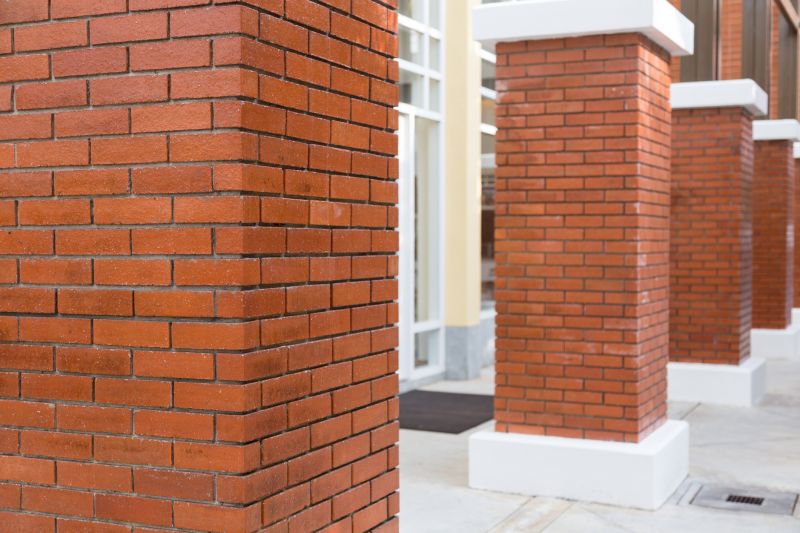Top-Rated Products For Building Reliable Brick Columns With Confidence
Identify high-performance materials and tools that ensure your brick column projects are structurally sound and aesthetically pleasing.
 Constructing brick columns requires careful selection of products that ensure stability, durability, and aesthetic appeal. From foundational supports to decorative accents, the right components can significantly influence the overall outcome of a brick column project. Understanding the variety of products available can help homeowners and builders make informed decisions tailored to their specific needs and design preferences.
Constructing brick columns requires careful selection of products that ensure stability, durability, and aesthetic appeal. From foundational supports to decorative accents, the right components can significantly influence the overall outcome of a brick column project. Understanding the variety of products available can help homeowners and builders make informed decisions tailored to their specific needs and design preferences.
Top Overall Option
Concrete Masonry Units (CMUs)
Concrete masonry units are versatile and widely used in brick column construction due to their strength and durability. They provide a solid core for structural stability and can be easily layered with mortar and decorative veneer. CMUs come in various sizes and finishes, allowing for customization to match different architectural styles.
Types of Products For Brick Column Constructions
Mortar Mixes
Essential for bonding bricks and other masonry units, mortar mixes come in different formulations suitable for various climates and load requirements.
Reinforcing Steel Bars
Reinforcing bars add structural strength to brick columns, helping them withstand lateral forces and weight loads.
Brick Veneer Cladding
Thin brick veneers provide a realistic brick appearance without the weight of traditional bricks, ideal for decorative columns.
Column Caps and Finials
Decorative caps and finials enhance the visual appeal and provide a finished look to brick columns.
Anchor Brackets
Anchor brackets secure brick veneer or panels to structural supports, ensuring stability and alignment.
Waterproofing Sealants
Sealants protect brick columns from moisture infiltration, extending their lifespan and maintaining appearance.
Expansion Joints
Expansion joints accommodate movement and prevent cracking in brick columns caused by temperature changes.
Structural Reinforcement Mesh
Mesh reinforcement provides additional support within mortar beds, improving overall stability.
Decorative Molds and Forms
Molds and forms assist in creating uniform shapes and decorative patterns in brick columns.
Grout and Fillers
Grouts fill voids and strengthen the core of brick columns, especially when integrating reinforcement.
Base Plates and Supports
Base plates provide a stable foundation for brick columns, ensuring proper load distribution.
Decorative Stone Accents
Stone accents can be added to brick columns for a textured, natural look.
Popular Choices
Precast concrete columns are manufactured off-site and delivered ready for installation, offering consistency and ease of use.
Veneer panels provide a quick way to achieve the appearance of traditional brick with less labor and weight.
Additives improve mortar flexibility and adhesion, facilitating easier installation and better performance.
Wall ties help secure brick veneer to structural supports, maintaining alignment and stability.
Caps add finishing touches to brick columns, enhancing visual appeal.
Membranes help protect brick columns from water infiltration and damage.
Colorants allow customization of mortar to match or accentuate brick colors.
Mesh reinforcement enhances the integrity of brick columns, especially in seismic zones.
Anchors secure brick elements to structural supports, ensuring stability over time.
Finishes such as textured coatings or paint can add character to brick columns.
Foundation supports provide a stable base for brick columns, preventing shifting or settling.
One of the most critical aspects of brick column construction is choosing the appropriate support system. This includes durable mortars, sturdy reinforcement materials, and reliable anchoring solutions that can withstand structural loads over time. Additionally, finishing elements such as caps and decorative trims can enhance the visual impact of the columns, blending functionality with style.
When selecting products, it is essential to consider compatibility with existing building materials, ease of installation, and long-term performance. Properly chosen components not only improve the structural integrity but also contribute to the overall aesthetics of the project. Whether constructing a simple garden pillar or a grand architectural feature, a wide range of products is available to suit various design visions and construction requirements.
By exploring different product types and understanding key considerations, builders can ensure their brick columns are both attractive and structurally sound. The following sections highlight a top overall product choice, trending options, and important factors to keep in mind during the selection process.
Key Buying Considerations
- Assess the load-bearing requirements and select products rated for your specific structural needs.
- Choose materials compatible with your existing building components to ensure seamless integration.
- Consider the climate and environmental conditions to select appropriate waterproofing and sealing solutions.
- Evaluate ease of installation, especially if undertaking DIY projects or working with limited experience.
- Determine the desired aesthetic look, whether traditional, modern, or decorative, and select products accordingly.
- Check product durability and resistance to weathering to ensure long-term performance.
- Review compatibility of reinforcement materials with masonry units for enhanced stability.
- Factor in maintenance requirements and select low-maintenance products when possible.
- Ensure proper sizing and measurements to fit your specific column dimensions.
- Consider the potential for future modifications or expansions and choose adaptable products.
- Look for products with clear installation instructions and technical support options.
- Evaluate the availability of replacement parts or additional components for ongoing projects.
- Review safety considerations, including non-toxic materials and safe handling procedures.
- Compare product warranties and guarantees to protect your investment.
- Factor in budget constraints while prioritizing quality and suitability for your project.
This content contains affiliate links. We may earn a commission if you purchase through these links, at no additional cost to you.
